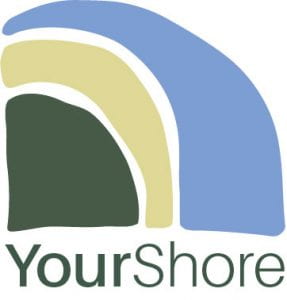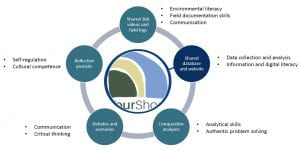Examining mobile learning projects in ecology and environmental science
I’m Dr Elisa Bone – a Senior Lecturer in Higher Education at the Melbourne CSHE. I introduced myself on this blog back in April 2021. I have a background in zoology and marine ecology and a strong interest in facilitating collaborative, authentic place-based learning in the ecological sciences. Through the recent MGSE Researcher Development Scheme, I was successful in receiving seed funding to support my project ‘Evaluating the feasibility of collaborative mobile learning systems in environmental science’.
Universities are increasingly using mobile and digital technologies in teaching and the extent of these tools has accelerated owing to the COVID-19 pandemic. Mobile technologies have the potential to provide students with opportunities for flexible and collaborative learning and are increasingly attractive to field-based environmental science and ecology disciplines. In addition, they offer the potential for allowing student cohorts from disparate locations to share their data and field experiences. Whilst this potential is exciting, there is a need to first bring together coherent systematic data describing how mobile learning technologies are being used in these disciplines, and to identify factors that may lead to their feasibility and sustainability over the longer term.
 This work is part of a broader project that seeks to develop a collaborative learning systems for ecology across several universities, utilising a mobile application YourShore – developed in collaboration with the FAIMS group – as a centrepiece.
This work is part of a broader project that seeks to develop a collaborative learning systems for ecology across several universities, utilising a mobile application YourShore – developed in collaboration with the FAIMS group – as a centrepiece.
This MGSE-funded project takes a step back to examine whether these systems are operating in an institutional and pedagogical context that is conducive to their success and sustainability. The project has four broad components:
(1) A rapid systematic review of the recent literature
In this project phase, we’ll compile recent literature describing the use of mobile learning in ecology and the environmental sciences and extract and collate descriptive data on the project context (institutional, curriculum, instructor) and measures of success. Given the rapidly evolving field, conference and workshop papers will be included alongside the peer-reviewed literature. A rapid review process (sensu Cochrane rapid reviews) will be followed, using the Covidence tool to facilitate screening.
(2) Analysis of institutional documents
Strategic and curriculum documents from each of three universities involved in the broader YourShore project – the University of Melbourne, Hong Kong University, and the University of Johannesburg – will be examined using content analysis to identify areas that align with the goals of mobile learning projects, including keywords such as collaboration, teamwork, communication and digital literacy.
(3) A survey of instructor capacity and aptitude for mobile digital learning
 We will survey instructors in ecology, environmental science and other field-based subjects at each institution to examine how they approach integrating mobile learning and collaborative digital tools into their curriculum. This survey will be based on the TPACK (Technology, Pedagogy and Content Knowledge) framework, which aims to bring together the diverse considerations required for building educational technologies that are suited to the pedagogical purpose and the disciplinary context.
We will survey instructors in ecology, environmental science and other field-based subjects at each institution to examine how they approach integrating mobile learning and collaborative digital tools into their curriculum. This survey will be based on the TPACK (Technology, Pedagogy and Content Knowledge) framework, which aims to bring together the diverse considerations required for building educational technologies that are suited to the pedagogical purpose and the disciplinary context.
(4) Student experiences with a pilot mobile application (2022)
We will use lessons learned from the first three project phases to inform the further development of YourShore and linked learning activities and trial these within a fourth-year course at Hong Kong University in mid-2022.
With my collaborator at HKU, Associate Professor Bayden Russell, we will build a shared database for recording YourShore data and learning activities that allow students to share field data and reflections, and evaluate the utility of this pilot system by surveying student experiences. A digital learning ecosystem has the potential to facilitate the development of several broader graduate attributes, within the context of exploring coastal and estuarine ecology and human impacts on these systems.

Further reading
Bone, E.K., Greenfield, R. Williams, G.A. & Russell, B.D. (2020). Creating a digital learning ecosystem to facilitate authentic place-based learning and international collaboration – a coastal case study. Concise paper: ASCILITE 2020 Conference Proceedings.
Burt, J.A., Killilea, M.E. & Ciprut, S. (2019). Coastal urbanization and environmental change: Opportunities for collaborative education across a global network university. Regional Studies in Marine Science 26: 100501. DOI: 33Thttps://doi.org/10.1016/j.rsma.2019.100501
O’Neil, J.M., Newton, R.J., Birney, L.B, Bone, E.K., Green, A.E., Merrick, B, Goodwin-Segal, T., Moore, G., Fraoli, A., & Dennison, W.C. (2020). Using urban harbors for experiential, environmental literacy: Case studies of New York and Chesapeake Bay. Regional Studies in Marine Science 33: 100886. 33Thttps://doi.org/10.1016/j.rsma.2019.100886